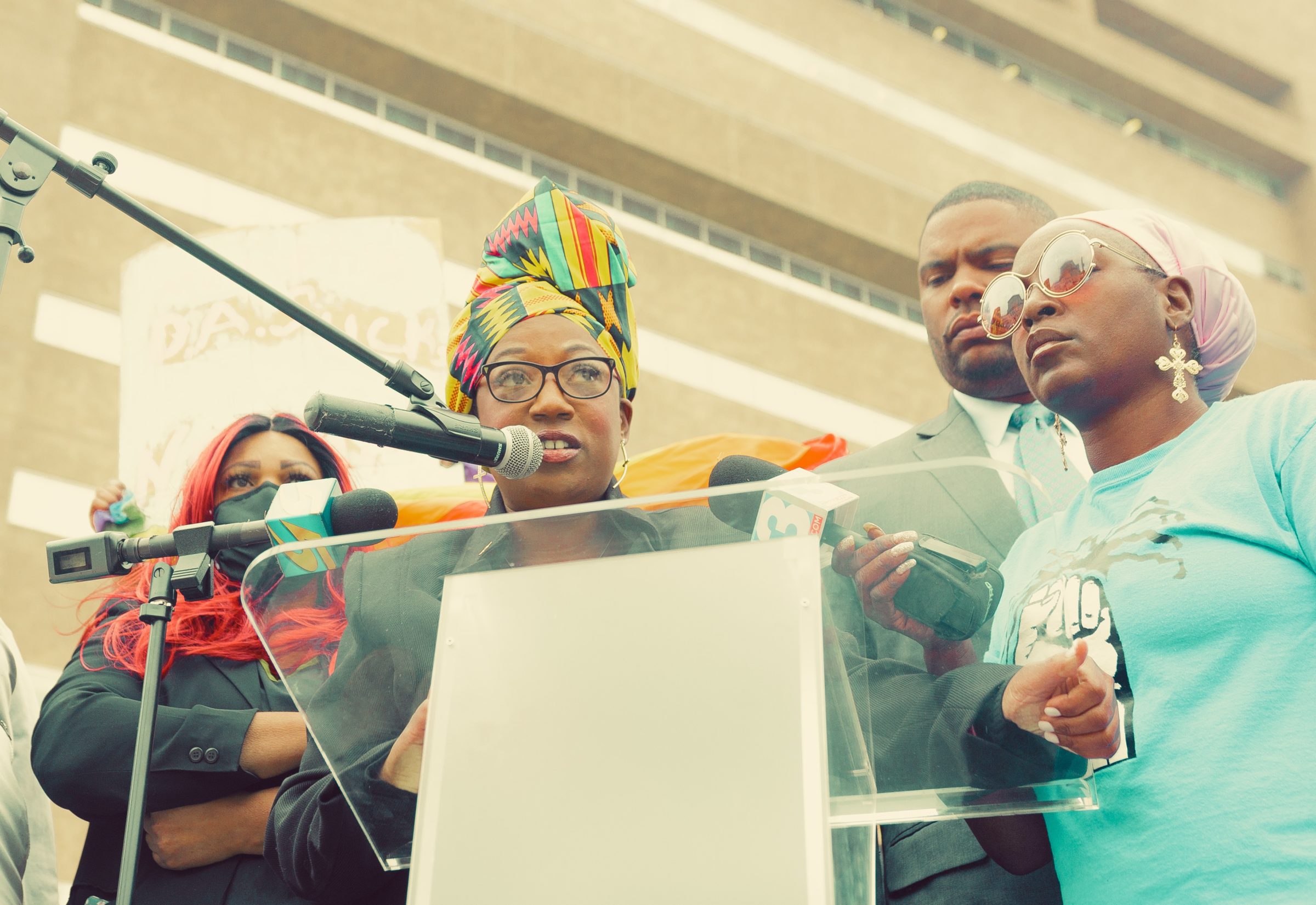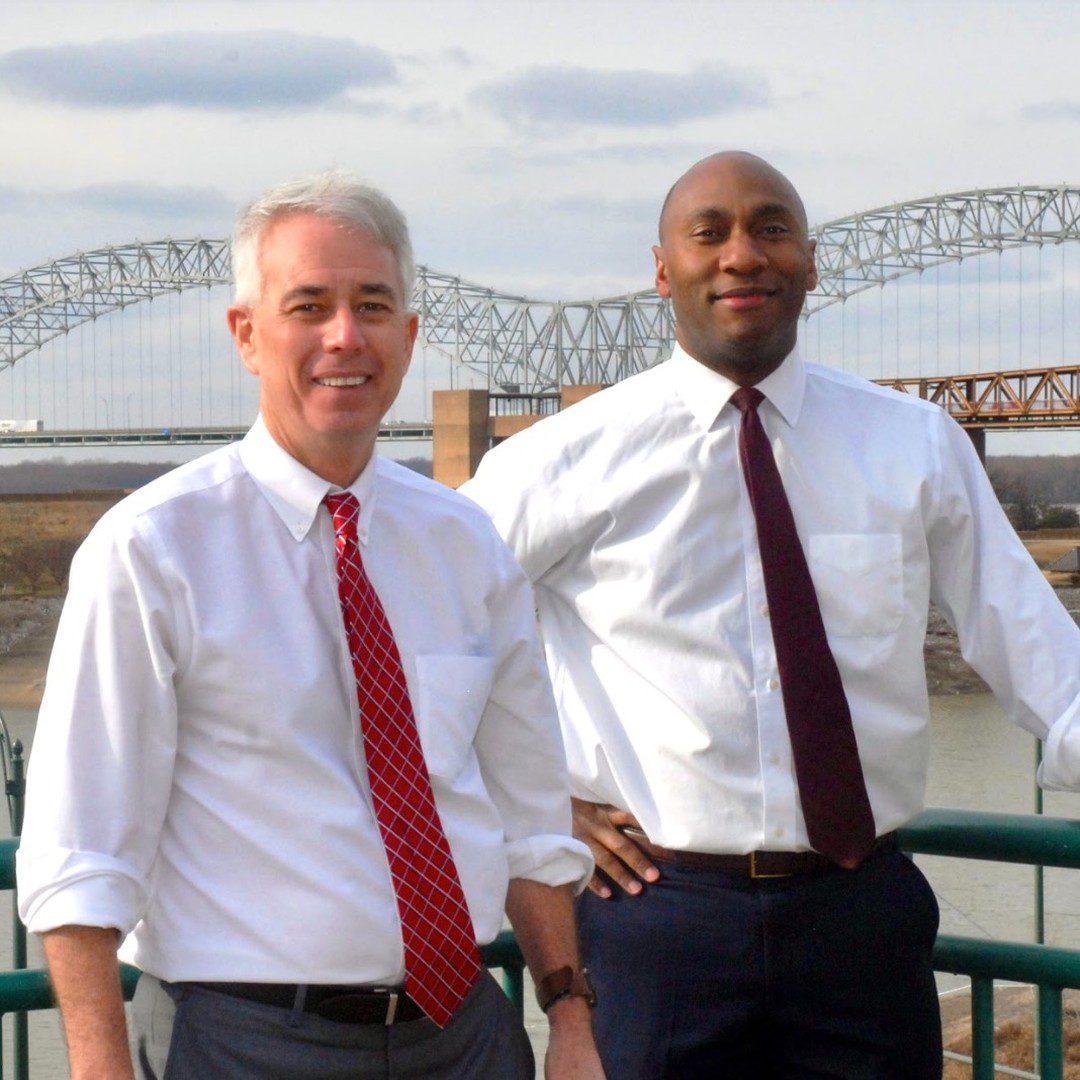Tennessee DA Faces Voters, Months After Prosecuting Activist for Wanting to Vote
The charges against Pamela Moses, a Black woman initially sentenced to six years in prison for registering to vote, offered a window into the inequities of the criminal legal system in Shelby County.
Daniel Nichanian | August 2, 2022


Pamela Moses wanted to register to vote and run for office in Memphis, but she had been stripped of those rights. As a Black Tennessean, she was far from alone. One in five Black adults in the state are barred from voting due to a felony conviction, the result of harsh disenfranchisement laws and a wildly unequal legal system.
Still, Moses believed she was eligible to have her rights restored. She sought guidance from the probation office and received written confirmation that she was indeed eligible. But Tennessee’s rules for restoring voting rights are so dizzyingly complicated that even state workers get it wrong. In fact, Tennessee had banned Moses from voting for life. And after Moses followed a probation officer’s bad guidance and tried to register to vote, prosecutors threw the book at her.
Shelby County DA Amy Weirich took Moses to trial for illegally registering to vote, and then trumpeted her conviction and sentence when a Memphis judge sent Moses to prison for six years in January. The case sparked an outcry after The Guardian revealed that the state had given Moses faulty guidance and had already identified its error at the time of the conviction. The judge pointed to prosecutors’ failure to disclose evidence showing that Moses had been misled to order a new trial and Weirich then announced that she would drop the charges.
“Nobody, including Pam Moses, should ever face criminal charges for attempting to restore their voting rights,” Tikeila Rucker, an organizer with the group Memphis for All, told Bolts. “How or why DA Weirich sent a community activist, advocate, and voting rights activist to jail for six years is incomprehensible.”
To Rucker, Moses’s prosecution was an effort to suppress democracy in the county’s Black community. “Moses is an example to the people: don’t you have the audacity to fight for change, to be the change, to step up against authority,” Rucker said. “That right there is the subliminal message.”
Moses also believes that she was targeted due to her race, political beliefs, and public activism on behalf of Black Lives Matter. “I think that the goal was to scare people,” she told Bolts shortly after being released in March, “but it could boomerang.”
Whether the aggressive prosecution of Moses boomerangs for Weirich will be tested on Thursday, when voters will decide whether to keep her in office.
Weirich, a Republican, faces Democratic nominee Steven Mulroy, with the winner securing an eight-year term. Although Shelby County leans blue, Tennessee holds the general election for county offices over the summer, and lower turnout could scramble expectations. In addition, many residents like Moses remain barred from voting.


Mulroy, who beat two other Democrats in the party’s primary in early May, is a fixture in local politics, having served as a county commissioner from 2006 to 2014. Now a law professor at the University of Memphis, he is running for on a platform that emphasizes criminal justice reform. In candidate questionnaires and media interviews, he has pledged a slate of changes to local practices—including working to reduce pretrial detention, decreasing the transfer of minors into adult court, and prosecuting fewer lower-level offenses like drug possession.
These are all major issues in Shelby County, a majority-Black county of more than 900,000 residents. Local advocates have denounced local bail practices as discriminatory and unconstitutional, and a report released last year by a court-appointed inspector documented that people are held pretrial in the county jail “for months or years.” Moreover, Shelby County prosecutes far more children as adults than other counties in Tennessee, a process that is initiated by the DA’s office, and nearly all of the youth transferred to adult court are Black. (The rate was 97 percent in 2018 and 95 percent in 2019, according to The Memphis Flyer, compared to an overall county population that is 54 percent Black.)
Shortly after Moses was released from prison in March, a coalition of local advocates, including members of Memphis for All and Just Audit, called for a racial equity audit of Weirich’s office.
“The reality is that disparate treatment of the Black community is continuing to take place and has taken place for far too long,” said Rucker, who is also demanding an audit.
Andrea Woods, an attorney at the ACLU who has criticized bail practices in Shelby County, told Bolts that the harsh prosecution of Pamela Moses offers a window to how Weirich’s office approaches other cases. “Fundamentally, it’s symptomatic of a county where the DA is over-prosecuting and criminalizing Black people,” Woods said. “There’s rampant overcriminalization and racial disparities, which the DA is a key driver of.”
Weirich’s campaign did not respond to questions about Moses’s case and her broader record as DA. She has said elsewhere that the fault lies with the Tennessee Department of Correction (TDOC) rather than by her office, and that her staff was unaware that the TDOC had acknowledged the mistake. “When reporters or political opportunists use the word ‘state’ they need to be crystal clear that the error was made by the TDOC and not any attorney or officer in the office of the Shelby County District Attorney,” she said in a statement after Moses’s conviction was overturned.
Mulroy, who says Moses should have not been prosecuted for registering in the first place, says Weirich’s handling of the case “fits a pattern.” “Overcharging and overreach is a theme with this prosecutor and has been for many years,” he told Bolts in a phone interview. “Pile on as many duplicative charges as possible to intimidate the defendants into a guilty plea that they might otherwise nor feel comfortable agreeing to.”
Mulroy says Weirich’s actions in Moses’s case also exemplify her predilection to impose a “trial penalty,” where prosecutors seek steep punishment if defendants don’t accept the initial plea deal offered. Weirich significantly ratcheted up the prison sentence she sought against Moses after Moses refused Weirich’s offer to plead guilty. “I gave her a chance to plead to a misdemeanor with no prison time,” Weirich said in February. “She requested a jury trial instead. She set this unfortunate result in motion and a jury of her peers heard the evidence and convicted her.” Mulroy says jumping from an offer with no prison time to seeking a sentence of six years is retaliation. “That’s not justice,” he told Bolts.
Under the state’s byzantine rules, it can be tricky for Tennessee residents who have lost the right to vote to determine whether they’re eligible to have them restored, and how to go about it. Tennessee is among just eleven states that does not automatically restore voting rights when people complete a sentence, and this places a heavy burden on them. The U.S. Department of Justice’s guide to rights restoration, released earlier this year, includes a three-page flow chart to help Tennesseans figure out their rights; rules vary based on the date of conviction, whether the conviction includes the word “infamous,” and the exact charge of conviction. Tennesseans who have lost the right to vote must also pay off all court debt to regain the right.
“You add all of that up, and you ask a layman to figure it out, and it’s pretty darn hard,” Mulroy said. “I studied this for a living and even I find them confusing.”


Mulroy indeed practices and teaches election law—an unusual background for a DA candidate, but one that has become very relevant in the race. He is an advocate for ranked-choice voting, has helped file lawsuits to expand voting rights, for instance to facilitate mail-in voting during the pandemic, and recently wrote a book on the topic. He told Bolts that he thinks this experience is relevant to his seeking the DA’s position given how criminal law is wielded to decide whether people are allowed to vote.
“The Pamela Moses case is a perfect example of the intersection between the two,” he said. “We have a racialized criminal justice system.”
Other states also have a maze of complicated restoration rules that threaten steep criminal consequences over errors, and zealous prosecutors threaten to ensnare people who make mistakes, like Crystal Mason, a Texas woman who wrongly thought she could vote while still on probation and was targeted by a conservative local prosecutor for casting a provisional ballot that wasn’t counted. This is a strong dynamic in Tennessee due to the large numbers of people who have lost their rights. Roughly 450,000 Tennesseans were barred from voting in 2020, according to the Sentencing Project; 39 percent of them were Black, compared to an overall state population that is 17 percent Black. Many more who are eligible to vote may not know it or worry about pursuing the option because of the example Weirich set with Moses.
“It does instill fear in the citizens when harsh laws are passed that criminalize what could be innocent behavior,” Linda Harris, a Memphis attorney who ran in the Democratic primary for DA and lost to Mulroy, told Bolts.
“What we’re talking about is individuals …who want to vote, they want a part of selecting other leaders,” Harris said. “So why is that a crime? Why is it a crime for people to want to vote? I don’t understand it.”
Mulroy says that, if elected, he would try to counter any chilling effect felt by residents who are unsure about their eligibility. “If I were DA, people should not worry about having their right to vote killed or intimidated by a prosecutor who is looking for ways to prosecute voters,” he said. “If a person is honestly unsure, and thinks they have a good faith basis for thinking that they can register or they can vote, then they won’t have to worry about being prosecuted if it turns out they’re wrong.”
He also criticized the felony disenfranchisement laws at the heart of Moses’s case, as well as other voter restrictions championed by state Republicans like voter ID rules. “We’re really just preventing huge numbers of people from voting who should be allowed to vote,” he said.
But Mulroy also did not rule out prosecuting people for registering to vote when ineligible, only saying that ”these kinds of crimes” would be a “very low priority” for his office. He told Bolts that DAs shouldn’t rule out whole categories of charges, as they should consider individual circumstances. He has also said he worries that making categorical promises would invite state Republicans to intervene and transfer cases to other prosecutors.
He has staked similar positions on the death penalty and abortion. “It is definitely the case that it would be a very low priority for me,” he told The Daily Memphian about prosecuting abortion cases. “Prosecutors should never say never, in large part because there’s a Tennessee law that would allow for the appointment of an independent prosecutor and basically stripping jurisdiction over that class of offenses away from the DA. But also just as a general prudential matter, DAs should not be in the habit of overruling things or ruling things out forever in the abstract.” He has also criticized Weirich for lobbying for harsher laws on reproductive rights.
On Thursday, Shelby County voters will decide the practices of the DA’s office and decide these major issues. And yet thousands of residents will be barred from participating because of their past entanglements with those same systems. Moses herself is permanently prohibited from voting, but she has called people to action, telling Bolts, “If you can’t get your right [to vote] back, support the people who are going to Nashville pushing for laws to be changed, show up with them: There’s strength in numbers.”

